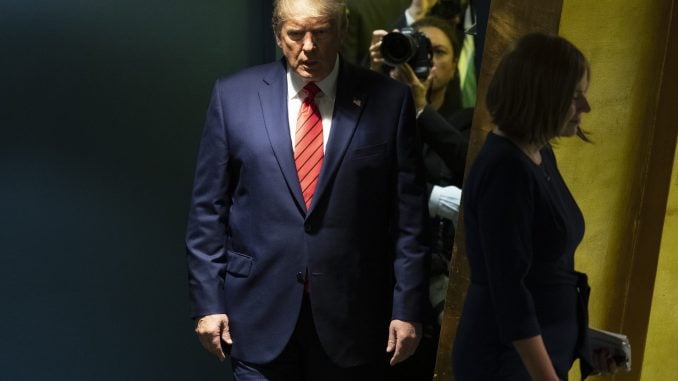
NEW YORK — President Donald Trump stood before the U.N. General Assembly on Tuesday and rejected “globalism” and liberal immigration policies while exhorting the world to act against Iran’s “bloodlust.”
Trump took aim at China, Venezuela and what he called a “growing cottage industry” of radical activists intent on pushing for open borders that harm national security and sovereignty. In a later meeting with British Prime Minister Boris Johnson, he fended off fresh questions from reporters about a growing movement by Democrats to impeach him.
As he addressed the General Assembly, Trump lambasted the World Trade Organization for giving China preferential treatment that he said was undeserved. He slammed socialism for bringing ruin to Venezuela. But he reserved much of his ire for Iran, which he called “one of the greatest threats” to the planet.
“Not only is Iran the world’s largest state sponsor of terrorism, but Iran’s leaders are fueling the tragic wars in both Syria and Yemen,” Trump told world leaders. “All nations have a duty to act. No responsible government should subsidize Iran’s bloodlust.”
The Trump administration’s hardline Iran policy got a boost on Monday from Britain, France and Germany, which blamed Iran for an attack on Saudi oil facilities earlier this month and said the time had come to negotiate a new deal with Tehran to replace the landmark 2015 nuclear accord from which Trump withdrew last year.
U.S. officials said they hope the new European stance would galvanize opposition to Iran and boost the “maximum pressure” campaign that the administration has pursued by increasing sanctions on the Islamic republic. There had been speculation, fueled by Trump himself, that he might meet in New York with Iranian President Hassan Rouhani, but officials said that prospect was increasingly unlikely, particularly after the joint statement from Britain, France and Germany.
Trump did, however, raise the possibility of a diplomatic breakthrough, saying, “The United States has never believed in permanent enemies. We want partners, not adversaries.”
Trump, facing reporters’ questions about Ukraine during his meeting with Johnson, said there was nothing inappropriate in his contacts with Ukraine’s president, which he said were aimed at fighting corruption. He later tweeted that the government on Wednesday would release a transcript of his talk with the Ukrainian president showing it was a “totally appropriate call.”
The president implored the world’s leaders to prioritize their own nations, with strong borders and one-on-one trade deals, rejecting sweeping transnational organizations and alliances.
“The future does not belong to globalists. The future belongs to patriots. The future belongs to strong, independent nations,” Trump told a murmuring crowd at the General Assembly. “Globalism exerted a religious pull over past leaders, causing them to ignore their own national interests. Those days are over.”
Though denouncing Iran’s aggression, Trump did not explicitly blame Tehran for recent strikes against oil facilities in Saudi Arabia. Iran has denied orchestrating the attack, which Secretary of State Mike Pompeo has deemed “an act of war.”
Trump urged Tehran to follow the example set by North Korea’s Kim Jong Un, even though the autocrat continues to hold a tight grip on his nuclear weapons.
Trump, who has met with Kim for a pair of summits and a historic step into North Korea, said this week that another meeting “could happen soon.” He provided few details, and it wasn’t clear what officials were doing behind the scenes to set up a meeting to break the diplomatic impasse over the North’s development of nuclear-armed missiles targeting the U.S. mainland.
“While anyone can make war, only the most courageous can choose peace,” said Trump, praising Kim.
He also delivered a bellicose warning to Venezuela. He denounced the government of Nicolás Maduro and declared that he awaited the day “when Venezuela will be free and when liberty will prevail throughout this hemisphere.” He called socialism “the wrecker of nations” and “destroyer of societies.”
His call came just a day after the United States and more than a dozen Latin American countries agreed to investigate and arrest associates and senior officials of Maduro’s government who are suspected of crimes such as drug trafficking, money laundering and financing terrorism.
He underscored the need for a fair trade deal with China, threatening more tariffs as China agreed Monday to purchase 600,000 tons of U.S. soybeans following trade talks in Washington last week. And linking sovereignty to strong borders, Trump chastised other governments for not doing their part on immigration.
“One of our most critical challenges is illegal immigration,” Trump said. He decried “radical activists” who “encourage illegal migration,” declaring that their policies are “not just. Your policies are cruel and evil.”
This was Trump’s third speech to the world body. In his 2017 speech, he dubbed Kim “Little Rocket Man” and denounced North Korea from the podium like he did to Iran this year. In last year’s speech, his praise for his own administration’s accomplishments drew laughs from the assembled leaders.


